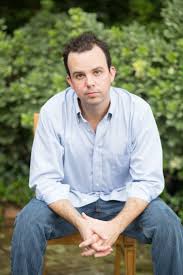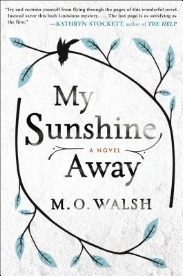Bookish People: M.O. Walsh
Y’all, forgive me. It’s been a while since I’ve posted a Bookish People interview, but I’m back with a good one!
Those of you who know my husband know he’s a runner. In the last several years, he’s concentrated his running on mountains and trails, which makes me happy because there are no cars or angry drivers to deal with. A few years ago, I traveled with him to the far reaches of Tennessee for a weekend stage-race at a horse farm. Not being a runner, I came supplied with a good book and my computer with the idea that I’d get some writing done. However, I didn’t even crack the computer open because I spent the entire weekend sitting in a fold-out chair with my nose in M.O. Walsh’s debut novel My Sunshine Away. It wasn’t an easy breezy read–it was gritty and dark and at times painful, but it also had a strong sense of nostalgia for easier days of childhood, plus unexpected sweetness and love. Walsh is so skilled with words and creating a sense of place–so much so that it carried me away from the heat and the strange bugs and the scary little roadside motel we stayed in. I really enjoyed it, so consider this my endorsement. (*Note if you’re a sensitive reader–like I said, there are some gritty, painful parts.)
I’m really excited to feature M.O. on Bookish People! And his is a fantastic interview. I laughed and nodded as I read through his answers. (It always makes authors feel better about themselves to hear another author talk about his or her struggles with writing! It’s self-serving, but it’s the truth. Or maybe it’s just my truth.) Anyway, I hope you enjoy the interview then check out his books. I’m already excited about his next one.

1. Give us a quick overview of the book(s) you’ve written.
My first book is a collection of short stories called The Prospect of Magic, which is about what happens when a travelling carnival goes bust in a small Louisiana town and the carnival workers decide to make a home there. The stories are kind of strange, halfway split between realism and a type of magical realism. As a note, I consider the story about a family of bat people to be realism. My most recent book is a novel entitled My Sunshine Away, which is a sort of coming of age literary suspense set in suburban Baton Rouge, mainly in the late 80’s and early 90’s.


2. What’s the hardest or best criticism you’ve received, either after your book was published or as you were editing, revising, or getting feedback?
I had a 6th grade teacher once send me an email to tell me that she loved my novel but she thought I should go back to sixth grade before I ever wrote another one. She was of the opinion that I (and all my editors and copyeditors, I suppose) don’t understand proper grammar. I think the fact the novel is written in first person, and follows more colloquial speech patterns, was an unsatisfactory answer to a person who has spent their life teaching the rules. I get that. Plus, I never take that sort of criticism too seriously. After all, no one could be as harsh to me in an email as I am to myself on a daily basis.
The best criticism has come from the dozens of teachers and peers I’ve had throughout my many years of schooling and writing. This advice typically tends to be about clarity, about making sure that readers can see the simple things you are describing before worrying about being pretty or smart. It’s important to remember that and I sometimes need to be reminded. Clarity. Clarity. Clarity.
3. Funniest (or best or worst) thing that happened during a book signing or book tour?
I had a reading at book festival where I walked in and saw about 10 people already there waiting (which is a great number!). I was pretty psyched. Plus, my family had come with me so all in all there were about 15 people. Then, when I got introduced, the people who had been waiting started to look confused. They shuffled around to find their programs and all, simultaneously, it seemed, realized they were in the wrong room. After they politely filed out, one by one, I realized it was just me and my family in there. Since they had all heard me read from that same book many times, I begged them to let me take them to lunch instead. However, like the loving family they are, they asked me to continue. I think they were hoping more people would show up, which they did not. I don’t know. I couldn’t help feeling guilty that they’d gotten out of their pj’s for that.
The best moments are typically those in which anybody shows up at all, in which you meet other writers and booksellers, perhaps see an old friend who now lives in that town you’ve travelled to. A store called Watermark Books in Wichita, Kansas once made a gumbo dinner for my reading, which was awesome. When I read at Lemuria in Jackson, where my grandparents used to live before they passed away, one of my grandmother’s dearest friends showed up and gave me a photo album full of pictures of them with my grandparents. Playing golf. Smiling. Being together in life. That sort of thing, any unexpected moment of connection, is hard to beat.
4. Describe your writing process. Is it orderly, scheduled, daily? Erratic, middle-of-the-night, gimme-a-piece-of-paper now? Or something in between?
I write best in the early mornings, before I’ve let the real world bat me around. However, these days, with a family and young kids and a full-time job, I pretty much have to steal my writing time. I don’t have any rituals or superstitions about it. I typically just look at the screen and think, why is this not as good as I want it to be?
5. Is there a topic/theme/setting you’re particularly interested in that you’d like to write about in a future book?
My first two books are set in Louisiana, as is the one I’m working on now. I think my next one, if I’m lucky enough to write it, will be, as well. I’ve lived here for most of my life and feel, when you’re writing fiction, it’s sometimes best to play to your strengths. I know what the houses look like here. I know which trees dot the medians. I know the heat. That helps.
6. What’s the strangest/most inappropriate place you’ve ever brought a book? (Example, a family dinner, a baseball game, etc.)
Does the bathroom count?
7. Tell us a few recent books you’ve read that you really liked.
I think Miss Jane, by Brad Watson, is one of the most beautiful novels I’ve read in years. I also really enjoyed Ready Player One, by Ernest Cline. That book was a lot of fun. I also thought Exit West by Mohsin Hamid was incredible and I learned a great deal about slow burning suspense from Megan Abbott’s novel You Will Know Me. As far as older books I finally got around to reading, the ones that most blew me away were The End of Vandalism by Tom Drury and The Brief Wondrous Life of Oscar Wao by Junot Diaz. I can also remember finishing Jess Walter’s novel Beautiful Ruins and thinking, damn, I wish I could write like that.
8. Can you name a book you liked that you didn’t think you would? Maybe because of the subject matter, or an author you didn’t think you enjoyed, or a genre you weren’t used to reading.
I liked The Martian by Andy Weir a good deal more than I thought I would. I don’t read a ton of sci fi, but that wasn’t what surprised me about it. What surprised me was the great pleasure I get, as a reader, out of watching problem-solving in novels. That book has a new problem every page, it seems, that we witness the narrator solve in surprising and inventive ways. I think that’s what all fiction ultimately does, present problems and try to solve them unexpectedly, but this book was like dosing that feeling with steroids.
9. What are your pet peeves as a reader—something you read in books that really bugs you?
I have way too many to list. The verb “pad” instead of walk. Errors in agency, like when a person’s hands feel greedy or jealous (which hands obviously can’t do). Eyes flashing. Mouths gaping. People having “frames” instead of bodies. I think most writers have these sort of pet peeves. They are the by-product of the hundreds of hours we spend berating ourselves about out our own prose. It doesn’t mean the other person’s writing is bad. It means that we have convinced ourselves that we are bad writers when we write that way. So, to see other people do it and get away with it just sets off a sort of petty sounding bell in our ear.
10. Books: print or e-reader? Similarly, calendar: paper or electronic?
Books: print or audio. Calendar: about 5 different ones on 5 different platforms that are inevitable un-synched.
11. Chocolate or vanilla?
Swirl.
12. Coffee or tea? Or something else?
Coffee if writing. Bourbon if not.
13. Tell us what you’re working on now.
I am working on a novel about what happens to a fictional town in Louisiana when a machine shows up at the grocery store that is able to predict, through the science of DNA, what people are truly capable of achieving. It is called The Big Door Prize and is slated for publication by Putnam in 2021. I imagine that seems like a long time from now to anyone who doesn’t actually have to finish the novel. To me, it feels like it is due tomorrow.
You can find M.O. on Twitter, Facebook, or on his website.
Thank you M.O. and thank you for reading!